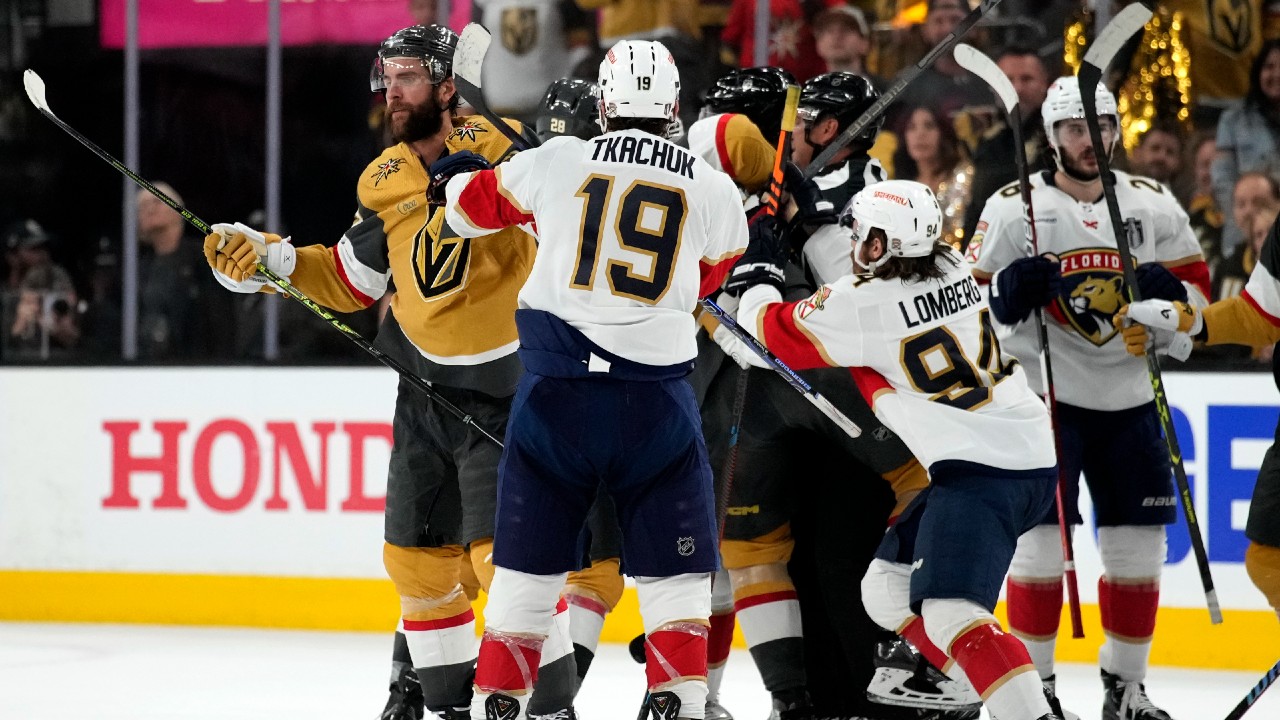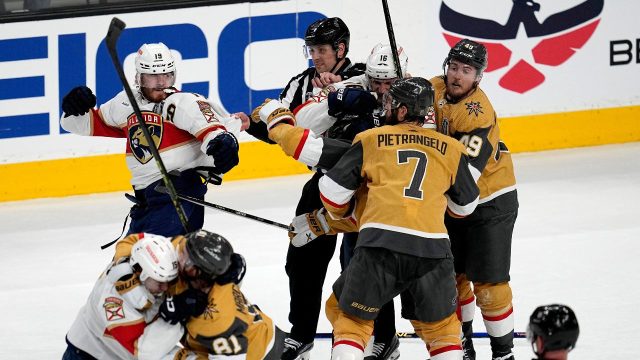
If the Vegas Golden Knights win the 2023 Stanley Cup – and to use a phrase befitting their city, you have to like their odds there – the defining theme of their success will be the phrase a few Knights wear on their backs before and after each game: It hurts to win.
Here’s the shirt:
By all accounts the aftermath of Jack Eichel getting crushed by Matthew Tkachuk in Game 2 included him rushing to the dressing room, getting his wits about him, then being repeatedly encouraged with the phrase from teammates. It’s their mantra, their crutch in hard moments, their reminder of the value of short-term pain for long-term gain.
In storybook fashion, Eichel then stays in the game, and on his first shift back on the rink he refuses to be outmuscled by Josh Mahura for a puck in the corner. He uses his elite vision and passing to fire a laser on the tape of Jonathan Marchessault, who scores and ends what at the time felt like the start of some real Panthers momentum.
After a quick Panthers goal that made it a three-goal game, we were at a series turning point that could’ve easily started to go the other way. But with that goal, and the score then 5-1, it felt like Florida could throw all they wanted at Vegas, and even their skill players weren’t going to go away. That’s deflating for any team trailing a game and series.
In his post-game press conference head coach Bruce Cassidy said of Eichel: “It’s OK to get hit in June. This is part of the journey. It hurts to win and it’s not supposed to be easy. Good for him.”
Teddy Blueger weighed in on the topic too: “It’s kind of like a brotherhood. You want to make that play, you’re willing to sacrifice yourself for the betterment of the next guy. The worst thing you can do is let your teammates down, right?”
Matt Roy, in the shirt at the top of this post says that the phrase “It hurts to win” means “Whatever it is you’ve got to do this time of year, you do it.”
You get the point.
This is not a new concept, nor a debated one in terms of its efficacy. My dad’s Islanders teams won 19 straight playoff series (is that good that seems good), including four straight Cups, the last of which led to this widely-shared anecdote from Wayne Gretzky about getting swept by the Islanders in the 1983 Cup Final:
“We walked by their locker room in the corridor and saw after they won they were too beat up to really enjoy it and savour the victory at that moment. We were able to walk out of there pretty much scot-free. We had so much respect for the Islanders players and the Islanders teams that we learned immediately you have to take it to another level in order to win a Stanley Cup. And that’s what we did. We learned from it and often credit the Islanders players and Islanders teams for teaching us exactly what it’s all about and how hard it is to win.”
I can tell you, for certain, that those Islanders players who paid the price in those moments have found plenty of time to enjoy their victory in the ensuing 40 years.
My own experience with this includes a couple of lower-level championships, and over those post-seasons (and the ones in the following years) I pursued titles while playing with a broken thumb, a mangled sternoclavicular joint, an inflamed tendon sheath in my wrist, bone-bruised ankles and more.
Unfortunately, you cannot play professional hockey safely. It’s not exactly MMA in terms of risk, and it might not even be the NFL in this regard. But the size and speed of the players, with legal contact, the speed and consistency of the puck and the frequency with which playoff games are played make it literally impossible for a team to win the Stanley Cup and have all their players report they’re injury free. It has never happened in the history of the sport. Like it or not, it’s a part of the fabric of the game.
Players are not naïve to this reality, not from the day they get to a competitive level, because to compete, you immediately recognize every few shifts you’re faced between the choice to take the easy way, or the more effective way. Like those aforementioned MMA fighters, the risk of some pain has to be accepted, or it’s just not a game in which you’re going to be able to excel.
There’s a dark side of hockey that’s been well-covered, and one I’ve written more about in my book (which is available here!). Painkillers have been overprescribed for years. Players suffer the lasting effects of brain trauma. Bodies are changed forever when you accept the risk of injury in your line of work and come out on the wrong side of said gamble.
Knowing that, the NHL has made a concerted effort in more recent years – and if not the NHL, than those covering it – to avoid glorifying these injuries. The outcry against the glorification of this sacrifice arguably peaked during the 2020 Stanley Cup Final, when the NHL put forth a promotional video that was tweeted with the phrasing “To hoist the Stanley Cup… There is a price to pay.”
In that video, they showed players giving their bodies for the good of their team, and the damage some incurred. They showed that yeah, it does hurt to win, and frankly, asking people to stare directly at the sun did not go over well.
It led to a backlash and to the eventual deletion of that tweet, as maybe it wasn’t the best thing for the league – the very league that had to pay out 19 million dollars in 2018 to retired players who said the league hid what it knew about brain injuries – to highlight as a cool part of the game.
In some small way, at least in public discourse, pain-for-gain has become a taboo topic, which … I’m not sure is the outcome players would want.
It’s a weird thing now for fans and media to avoid looking at, because we’ve all mostly accepted that’s what the game requires too, haven’t we? We know it’s a physical game that comes with risk, and that the juxtaposition of force and skill is part of what makes it such a spectacle. Players who can keep their composure and make these sometimes-delicate passes amidst the roller derby, like an elegant wildflower growing from the concrete, aren’t those the moments that leave our jaws on the floor?
As a former player who’s been through it at the lower levels, and seen the aftermath of my dad’s career (which hasn’t been filled with great long-term outcomes, but ones he says he’d accept again), I’m torn on the topic of highlighting the short-term pain required to achieve hockey’s greatest goal.
I’d be lying if I said that my inherent feeling isn’t that it should be … maybe not glorified, but at least elevated as an inspiring element. Because it does take courage to play the game at playoff 100 per cent pace, and the commitment guys show to win for one another and to achieve their life-long dreams is admirable.
I know that these players have accepted that risk, I know what it means to them, and I know how justifiable it feels to those players. So to turn away from that aspect of the game – the warrior, gladiator angle – to avoid looking directly at what’s happening, it almost feels like it does them a disservice.
But I like to think I’m a reasonable enough guy to recognize that there’s a way to acknowledge and admire it without glorifying it. You don’t want young kids putting that element at a premium, as it should rank far below so many other facets of the game.
There’s some middle ground here, and I hope the swings of the cultural pendulum get us to a point where we can openly admire the courage it takes for Jack Eichel, a guy whose body has been through the ringer, to get back on the horse in that Game 2 and make a big play for his team.
If he’s accepted that, whether it’s the right thing for his ability to play golf at 50 or not, he deserves some measure of praise for that commitment. We should be able to appreciate the consistent chutzpah of penalty-killing D-men who stand in front of slap shots. And we shouldn’t lose the reality that part of what makes winning the Stanley Cup so impressive is that no team makes it through unscathed, and accepting that and marching forward to victory anyway is worthy of some applause.
Alone, it’s not what makes the game great. When you roll the dice on risk often enough, there will be bad outcomes, and make no mistake, those will pop up again. But seeing Mark Stone rally from back issues to get near his ultimate goal, I could not be more impressed by his drive for success. Same for Eichel. Same for countless players who won’t get to the mountaintop, at least not this year.
The Stanley Cup means everything to hockey players, and it hurts to win. Enduring that pain isn’t the most impressive element of winning it, but you can’t truly admire that gain without acknowledging their considerable amount of accepted pain.







